Breast Milk is liquid gold for a baby. Your newborn derives all his nutritional needs from it. All research points to the manifold benefits of breast milk. Exclusive breast feed for 6 months will keep your baby healthy and happy. Yet, at times the milk supply in a mother might fall short, especially during growth spurts. After 6months, some parents might choose to start formula milk along with breast feed and solid food. This new addition to the baby’s needs might confuse parents. Hence, I decided to share with you exactly how we prepared my son, Kabir’s, formula feed.
Keep this in mind before preparing formula milk for your baby
 Hygiene► Before I take you through the steps, I have to highlight the importance of hygiene while preparing formula milk. One must always wash their hands properly, before touching anything that is related to baby feed. This will reduce the chances of any germs contaminating your baby’s milk. The feeding bottle, measuring spoon and all apparatus should be washed and sterilized before each use. Your feeding station, the area where your child’s formula is prepared, should be spotless clean. Dust, wipe, wash and sterilize. This will greatly reduce any chances of infections entering your baby.
Hygiene► Before I take you through the steps, I have to highlight the importance of hygiene while preparing formula milk. One must always wash their hands properly, before touching anything that is related to baby feed. This will reduce the chances of any germs contaminating your baby’s milk. The feeding bottle, measuring spoon and all apparatus should be washed and sterilized before each use. Your feeding station, the area where your child’s formula is prepared, should be spotless clean. Dust, wipe, wash and sterilize. This will greatly reduce any chances of infections entering your baby.
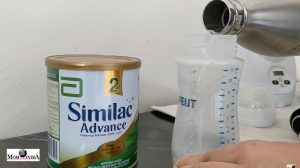 Storage► Another important point is Storage. The lid of a formula tin should be tightly shut. Formula should be stored in a cool and dry place, away from sunlight. No moisture should enter it. Moisture would coagulate and contaminate the baby formula. Any coagulation in formula should be taken seriously. Dispose of that tin/pack immediately. Please do take the time to read all the details on the formula tin/pack. Your awareness keeps your baby safe.
Storage► Another important point is Storage. The lid of a formula tin should be tightly shut. Formula should be stored in a cool and dry place, away from sunlight. No moisture should enter it. Moisture would coagulate and contaminate the baby formula. Any coagulation in formula should be taken seriously. Dispose of that tin/pack immediately. Please do take the time to read all the details on the formula tin/pack. Your awareness keeps your baby safe.
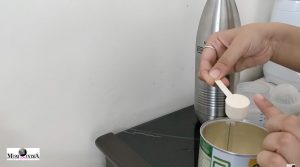 Shelf-Life► Also, the marked shelf life of the formula should be adhered to. Most formulas advise it to be used within 3 weeks of opening. Once the formula tin is opened, keep a track of the days that have passed. Sometimes the baby consumes less formula in that time period. Do not use the formula if it’s past the shelf life. I do understand that formula is expensive, however as parents our baby’s health is of utmost importance.
Shelf-Life► Also, the marked shelf life of the formula should be adhered to. Most formulas advise it to be used within 3 weeks of opening. Once the formula tin is opened, keep a track of the days that have passed. Sometimes the baby consumes less formula in that time period. Do not use the formula if it’s past the shelf life. I do understand that formula is expensive, however as parents our baby’s health is of utmost importance.
I would strongly recommend for you to watch the video content linked here to understand our feeding station setup. We set it up in the corner of our bedroom itself, so that we could make a formula feed at a moment’s notice. Our set up was always kept clean. We chose to invest in a bottle warmer, sterilizer and a 1ltr flask (to keep boiled water hot for about 8hrs). We researched well to find the right bottles and formula for our baby. Do ask your pediatrician for guidance on the brand of formula that you should use.
Making Formula Milk for you baby
When you start formula, most pediatricians will advise to start with a small quantity. The bottles have ounces or ml marked on the side. Pour water from the flask as per your baby’s needs. Always firmly place the bottle on a flat surface. This would help you to exactly follow the measurement of water, that you pour into the bottle.
 ►The water should be lukewarm- around 40 degrees. The breast milk too is around the same temperature. Do not give boiling water or cold water to your baby. We boiled water twice a day and stored it in the flask. This eliminates last minute heating and cooling of water for the formula.
►The water should be lukewarm- around 40 degrees. The breast milk too is around the same temperature. Do not give boiling water or cold water to your baby. We boiled water twice a day and stored it in the flask. This eliminates last minute heating and cooling of water for the formula.
 ►The measurement of formula is always indicated on the tin. Usually, it is one scoop of powder for one ounce. The scoop (spoon) comes with the tin. Level the spoon and add the powder. Do not dilute the formula with extra water. This will take away the nutrition value from the baby’s feed.
►The measurement of formula is always indicated on the tin. Usually, it is one scoop of powder for one ounce. The scoop (spoon) comes with the tin. Level the spoon and add the powder. Do not dilute the formula with extra water. This will take away the nutrition value from the baby’s feed.
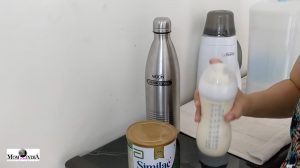 ►Cap the bottle tightly and shake it well. The formula should completely dissolve in the water. This step will greatly reduce the chance of indigestion. Once dissolved let the bottle rest for a minute or two, till the bubbles in the bottle settle.
►Cap the bottle tightly and shake it well. The formula should completely dissolve in the water. This step will greatly reduce the chance of indigestion. Once dissolved let the bottle rest for a minute or two, till the bubbles in the bottle settle.
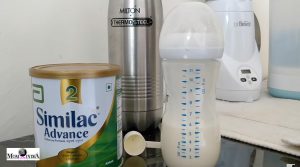 ►Meanwhile you can use the few minutes to put your feeding station into order for the next feed. Do not put the measurement spoon back into the tin. Wash it , sterilize and air dry, before using it again. Double check that the lid of the formula tin is tightly closed. Then test the temperature of the formula by sprinkling a few drops at the back of your hand. Your baby feed is now ready.
►Meanwhile you can use the few minutes to put your feeding station into order for the next feed. Do not put the measurement spoon back into the tin. Wash it , sterilize and air dry, before using it again. Double check that the lid of the formula tin is tightly closed. Then test the temperature of the formula by sprinkling a few drops at the back of your hand. Your baby feed is now ready.
If you set up your feeding station well, this entire process just takes about 5 minutes. However, I would like to re-emphasize the importance of breast milk. Should you want to supplement it with a few formula feeds, do keep the above steps in mind. I would strongly advise not to give cow’s milk to a baby, when the baby is less than a year old. Cow’s milk has certain proteins that are very difficult to digest. Formula milk, though expensive, is meant for a baby. Hence breast milk should only be supplemented by formula.
I hope this article helps in solving most of your questions. You can always reach me by writing a message. Share it with as many parents as you can. Our experiences in parenting bring us into a close-knit family. Enjoy Simplified Parenting.
♥♥बच्चों के लिए फार्मूला दूध कैसे बनाये, इस टॉपिक पर है ये आर्टिकल | ये जानकारी हिंदी में पाने के लिए निचे दिए गए वीडियो को देखें ►









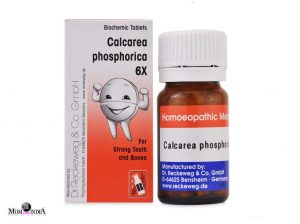 You might choose to give a time-tested homeopathic tablet called
You might choose to give a time-tested homeopathic tablet called 
 As for adults, there are certain foods that help in cleaning the intestine of its mucky discomfort. Pears, Prunes, Peaches and Papaya are super foods in such a case. I regularly mashed up one prune, to give it to Kabir. Any of the four food can be mashed up and mixed with Roti, rice or just can be given by themselves. The baby relishes it. Do check which of the four, your baby enjoys the most and add it to the baby’s regular diet. This would prevent any episodes of constipation.
As for adults, there are certain foods that help in cleaning the intestine of its mucky discomfort. Pears, Prunes, Peaches and Papaya are super foods in such a case. I regularly mashed up one prune, to give it to Kabir. Any of the four food can be mashed up and mixed with Roti, rice or just can be given by themselves. The baby relishes it. Do check which of the four, your baby enjoys the most and add it to the baby’s regular diet. This would prevent any episodes of constipation.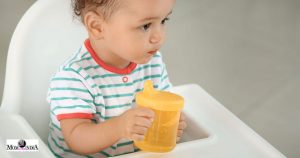 Introduction to solid foods triggers changes in a baby’s digestive system. Though the milk consumption carries on with it, babies often refuse water. Ensure that the baby drinks water, keeping the digestive system hydrated. Periodically give your baby a few sips of water.
Introduction to solid foods triggers changes in a baby’s digestive system. Though the milk consumption carries on with it, babies often refuse water. Ensure that the baby drinks water, keeping the digestive system hydrated. Periodically give your baby a few sips of water. I have always recommended daily massage for baby. We have made it a regular ritual in case of Kabir. Massage with lukewarm oil, be it coconut or any oil of your choice, before a bath or sleep time, helps a baby in multiple ways. However, if you can’t give a head-to-toe massage, do regularly massage your baby’s tummy. Following this up with a hot compress, will keep constipation at bay.
I have always recommended daily massage for baby. We have made it a regular ritual in case of Kabir. Massage with lukewarm oil, be it coconut or any oil of your choice, before a bath or sleep time, helps a baby in multiple ways. However, if you can’t give a head-to-toe massage, do regularly massage your baby’s tummy. Following this up with a hot compress, will keep constipation at bay.
 Breast milk is an elixir for a baby. Full of antibodies and easy to digest, it is better than any medication. Research shows that breastfed babies have a stronger immune system. It is the best preventive measure that a mother can employ. In case of a mild cold, being close to the mother’s breast comforts the baby. The heat from skin-to-skin contact helps the suckling baby to ward of cough and cold. Do try to breast feed you baby as much as possible.
Breast milk is an elixir for a baby. Full of antibodies and easy to digest, it is better than any medication. Research shows that breastfed babies have a stronger immune system. It is the best preventive measure that a mother can employ. In case of a mild cold, being close to the mother’s breast comforts the baby. The heat from skin-to-skin contact helps the suckling baby to ward of cough and cold. Do try to breast feed you baby as much as possible.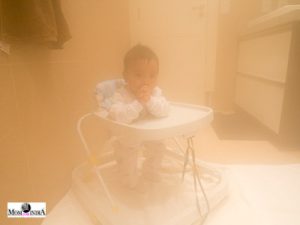 Like for adults, steam unblocks the nasal passages, open the pores and helps in dealing with congestion. For a baby, one can invest in a steamer. It’s easily available at any medical store and is cost effective. Fill the steamer with tap water till the indicated mark and switch it on in the bathroom (after closing the ventilation). As the steam fills the bathroom, step in your baby. While you play or comfort your baby in the bathroom, the steam in the air will unclog the congestion.
Like for adults, steam unblocks the nasal passages, open the pores and helps in dealing with congestion. For a baby, one can invest in a steamer. It’s easily available at any medical store and is cost effective. Fill the steamer with tap water till the indicated mark and switch it on in the bathroom (after closing the ventilation). As the steam fills the bathroom, step in your baby. While you play or comfort your baby in the bathroom, the steam in the air will unclog the congestion. Dry air caused due to weather condition or air-conditioning in the room can also cause irritation and breathing difficulty for your baby. An easiest way to avoid this is to use a
Dry air caused due to weather condition or air-conditioning in the room can also cause irritation and breathing difficulty for your baby. An easiest way to avoid this is to use a  This is the remedy that has worked its magic in our case. In fact, this has been a daily ritual. Every day, without fail, we gave him an oil massage, followed by a bath in lukewarm water. This opens the pores and avoids any accumulation of mucus in a baby. Generally, cough or cold can happen once a while to any baby. However, in our case due to this ritual, Kabir has had rare occasions of cold related discomfort. Do note that in case your baby is suffering from fever, one should avoid a bath. Luke warm sponge is a advised.
This is the remedy that has worked its magic in our case. In fact, this has been a daily ritual. Every day, without fail, we gave him an oil massage, followed by a bath in lukewarm water. This opens the pores and avoids any accumulation of mucus in a baby. Generally, cough or cold can happen once a while to any baby. However, in our case due to this ritual, Kabir has had rare occasions of cold related discomfort. Do note that in case your baby is suffering from fever, one should avoid a bath. Luke warm sponge is a advised.
 While suffering from cough and cold, it is uncomfortable for a baby to lay down flat on its back. The mucus in such cases restricts easy breathing and the child is unable to sleep. Hence either make the baby lie sideways or raise the angle of the baby’s head to a 30degree angle (be it with the help of a Dupatta or a small pillow). This will keep the baby’s nostrils open. A well slept baby will recover sooner
While suffering from cough and cold, it is uncomfortable for a baby to lay down flat on its back. The mucus in such cases restricts easy breathing and the child is unable to sleep. Hence either make the baby lie sideways or raise the angle of the baby’s head to a 30degree angle (be it with the help of a Dupatta or a small pillow). This will keep the baby’s nostrils open. A well slept baby will recover sooner
 A baby mostly cries for feed. The tiny little tummy doesn’t have a feeding pattern. The baby might suddenly feel hungry after peeing or pooping. Sometimes it is a sudden growth spurt that makes them want to drink more milk. Increase in thirst during change of weather or maybe the baby is just looking for some skin to skin feeding comfort. Feeding is hardly predictable. So, when your baby cries, check whether the little one is just hungry. Once fed, you have in your arms a happy baby.
A baby mostly cries for feed. The tiny little tummy doesn’t have a feeding pattern. The baby might suddenly feel hungry after peeing or pooping. Sometimes it is a sudden growth spurt that makes them want to drink more milk. Increase in thirst during change of weather or maybe the baby is just looking for some skin to skin feeding comfort. Feeding is hardly predictable. So, when your baby cries, check whether the little one is just hungry. Once fed, you have in your arms a happy baby. Every baby is different and they react differently to diapering. Sometimes the baby cries to indicate a full diaper, sometimes it’s about poop in it and some babies are even bothered about a single pee in the diaper. Easing the diaper discomfort by removing or changing the diaper, will bring a smile on your baby’s face.
Every baby is different and they react differently to diapering. Sometimes the baby cries to indicate a full diaper, sometimes it’s about poop in it and some babies are even bothered about a single pee in the diaper. Easing the diaper discomfort by removing or changing the diaper, will bring a smile on your baby’s face. By body temperature I don’t mean fever. It is simply that your baby is feeling hot or maybe it wants to be snug from cold. Like adults, a baby too can feel uncomfortable with temperature of the environment. Noticing whether the baby’s hands or feet are cold can help you understand it needs. Similarly, it the baby is sweating, especially on its head, it indicates that it’s feeling hot. Taking adequate measures to adjust the temperature to the child’s need or maybe adding/removing a layer of clothes, can easily address the issue.
By body temperature I don’t mean fever. It is simply that your baby is feeling hot or maybe it wants to be snug from cold. Like adults, a baby too can feel uncomfortable with temperature of the environment. Noticing whether the baby’s hands or feet are cold can help you understand it needs. Similarly, it the baby is sweating, especially on its head, it indicates that it’s feeling hot. Taking adequate measures to adjust the temperature to the child’s need or maybe adding/removing a layer of clothes, can easily address the issue. A baby gets tired easily. Moving arms and limbs, suckling milk and every little bit of activity is exhausting for the baby. Yet they have no way of expressing it, other than crying. To understand sleep necessities, it is best to look for signs like yawning, rubbing of eyes or a vacant stare. Keeping a track of the waking hours helps. Any of the above is a signal for you to make your baby comfortable enough to sleep.
A baby gets tired easily. Moving arms and limbs, suckling milk and every little bit of activity is exhausting for the baby. Yet they have no way of expressing it, other than crying. To understand sleep necessities, it is best to look for signs like yawning, rubbing of eyes or a vacant stare. Keeping a track of the waking hours helps. Any of the above is a signal for you to make your baby comfortable enough to sleep. Constant engagement is a baby’s favorite pastime. However, they get bored and distracted easily. The toy that they enjoyed for a few minutes might just be tossed off into the floor out of boredom. If your baby looks disinterested with the current toy or activity, it’s best to change it. This will calm down the temperament.
Constant engagement is a baby’s favorite pastime. However, they get bored and distracted easily. The toy that they enjoyed for a few minutes might just be tossed off into the floor out of boredom. If your baby looks disinterested with the current toy or activity, it’s best to change it. This will calm down the temperament. The toughest wails to calm down are the ones that are caused due to pain or discomfort. Gas or bloating is a common problem. If the baby needs to burp and is unable to do so, it cries out of discomfort. Even if you have burped the baby after feed, sometimes it might want to burp more. Like adults, it’s not necessary that a single burp has eased the digestion. Burping techniques will provide relief in such cases. For stomach gas issues, we have specifically linked this article which has home remedies for gas relief (
The toughest wails to calm down are the ones that are caused due to pain or discomfort. Gas or bloating is a common problem. If the baby needs to burp and is unable to do so, it cries out of discomfort. Even if you have burped the baby after feed, sometimes it might want to burp more. Like adults, it’s not necessary that a single burp has eased the digestion. Burping techniques will provide relief in such cases. For stomach gas issues, we have specifically linked this article which has home remedies for gas relief (